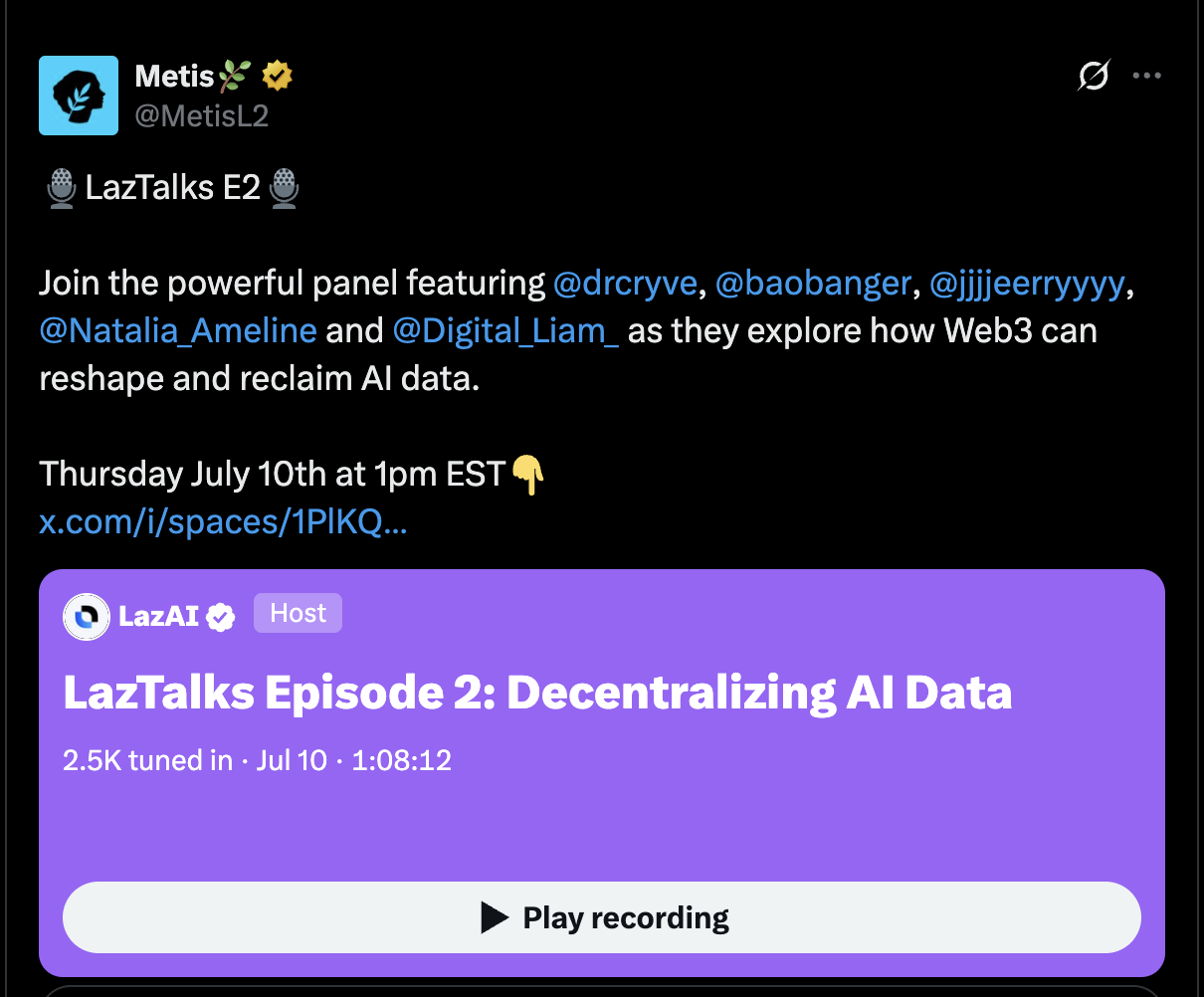.png&w=1920&q=75&dpl=dpl_2gkw8bfFQjR9VPXJF1v1txtwdH3g)
LazTalks Episode 2: Decentralizing AI Data Recap Blog
On July 10th 2025, LazAI hosted LazTalks Episode #2 on a Twitter Space to explore one of the most pressing questions in technology today. How do we decentralize AI data before it becomes permanently enclosed by corporate platforms?
Today, many users pay to access AI models while unknowingly handing over valuable training data. Essentially paying twice, once with your $20 monthly ChatGPT subscription and again with your data. That data fuels further model development, yet users receive no ownership, transparency, or reward. The discussion brought together voices from LazAI, Metis, Outlier Ventures, Delysium, and the broader Web3 ecosystem to ask what a better system might look like. Listen to the full X Space here or read the recap below.
Speakers
Natalia Ameline
Decentralization Coordinator at Metis & Advisor at LazAI
Twitter
Website
Dr. Achim Struve
Token Engineering Lead at Outlier Ventures
LinkedIn
Website
Jerry
Co-Founder of Delysium
Twitter
Website
Bao L
Web3 Growth Strategist
Twitter
Host:
Liam
Content Guy at Metis & LazAI
Twitter

Centralized AI Extracts Value
The conversation opened with a reflection on how centralised AI platforms operate. Users submit prompts, content, and preferences that power the models, yet they remain locked out of governance, attribution, and economic participation.
Natalia Ameline from Metis and LazAI pointed to this broken structure and explained how LazAI is building something different. LazAI’s mission is to enable clear data ownership, trustless attribution, and open contribution. It does this through infrastructure like Data Anchoring Tokens (DATs), which allow individuals to contribute AI data that is traceable, composable, and rewardable.
Natalia also highlighted LazPad as the new user-friendly gateway to this system. LazPad will offer a place for early contributors to interact with new agents, interact and grow with them, and unlock ownership in AI-native tools. It is a practical entry point for anyone who wants to play inside the new AI economy without needing technical expertise.
Future-Proofing AI Projects
Dr Achim Struve from Outlier Ventures brought a systems perspective grounded in token engineering and incentive design. He explained various challenges of centralized AI data sets including security, biases and privacy.
Outlier Ventures supports over 400 Web3 startups and helps many of them prepare for AI-native futures. Dr Achim described how Web3 can utilize blockchain transparency to fix these problems in the future. Their goal is to ensure projects are robust enough to evolve alongside AI agents who will increasingly take on decision-making roles within decentralized networks.
He positioned Ocean Protocol, LazAI, and other new projects as emerging examples of tools that can support this future readiness. This infrastructure will make it easier for new projects to launch with baked-in mechanisms for AI alignment, contributor rewards, and transparent data coordination.
Building AI Economies with Verifiable Data
Natalia also framed data not as a passive resource but as an asset that should carry proof, history, and rights. LazAI’s approach is to give each contribution a digital fingerprint using blockchain infrastructure. This makes it possible to verify where data came from, who contributed it, and how it is being used inside AI systems.
This model turns data into an active part of an internal AI economy. It allows developers and researchers to source high-quality datasets with built-in attribution, and it gives contributors an open route to earn and participate. Natalia made it clear that ownership, privacy, and alignment must be built into AI from the bottom up.
Live Experiment in AI-Human Alignment
Jerry, co-founder of Delysium, added perspective from the world of AI agents. He explained how centralized entities can farm user data without overt permission and how Delysium's agent network allows different AI agents securely share data and increase their collective intelligence over time. Delysium was founded with a clear vision to help humanity focus on building a better world while AI agents manage the demands of daily life.
All speakers agreed that AI and human alignment is essential. Natalia and Jerry both shared that this principle is not just a belief but a guiding force behind the infrastructure they are building.
Participation is Key
Bao L, a Web3 growth hacker, focused on how to make these systems scalable and attractive for users. Users want simple entry points where their actions have visible impact. Bao pushed for interfaces that make it easy to contribute data, tag content, test agents, or interact with model outputs.
He argued that sustainable growth comes from systems that reward curiosity and experimentation. People need to feel the loop immediately. Projects like LazPad address this by making early-stage participation feel like play while still offering long-term alignment and rewards.
Bao, a creative musician himself, emphasized that contributions should be fun, fast, and meaningful. This is how to build a real user base around decentralized AI.
A Shared AI Future
The speakers all pointed toward the same destination. A future where AI systems are open, accountable, and shared. A future where users co-create intelligence and earn from what they give. A future where infrastructure like Delysium, LazAI, LazPad, and similar projects empower entire communities to govern and grow AI economies together. We thank all speakers for taking the time out of their busy schedules to join this conversation and greatly look forward to Episode 3 of LazTalks.
LazAI is building a new kind of human-aligned AI stack and you’re invited. Follow us on socials and jump in the Developer Discord to stay ahead of community campaigns and developer opportunities. It is time to decentralize AI data for good.
